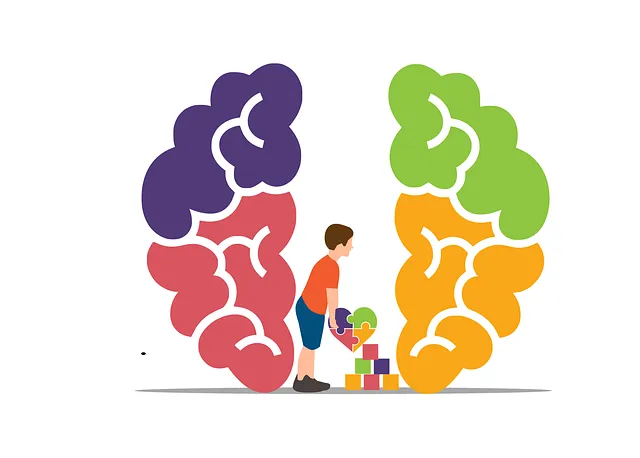The Denver Kaiser Permanente Mental Health Center offers a comprehensive approach to mental wellness through self-assessment tools, interactive assessments, and educational resources. These tools empower individuals to proactively manage their mental health by identifying concerns early. By integrating these resources into depression prevention and mental wellness coaching programs, the center provides personalized guidance tailored to its patient population. The production of a Mental Wellness Podcast Series with self-assessment content further reaches a wider audience, promoting open conversations about mental health. The development of these tools follows an evidence-based, culturally competent approach, ensuring effectiveness and relatability for diverse users. User-friendly interfaces engage users, encouraging active participation in their mental wellness journeys through stress reduction methods and journaling exercises. A collaborative process involving healthcare professionals ensures continuous improvement and refinement based on user feedback and community outreach programs.
At the Denver Kaiser Permanente Mental Health Center, we recognize the vital need for accessible and effective mental wellness self-assessment tools. This article explores the development of such tools, focusing on key components like accuracy and user experience. We delve into evidence-based practices, incorporating latest research to ensure efficacy. By designing intuitive interfaces, we enhance engagement and accessibility. Implementation strategies, feedback collection, and continuous improvement are also discussed, highlighting our commitment to supporting mental health at Denver Kaiser Permanente.
- Understanding the Need for Self-Assessment Tools at Denver Kaiser Permanente Mental Health Center
- Defining Key Components for Effective Mental Wellness Self-Assessment
- Incorporating Evidence-Based Practices and Research in Tool Development
- Designing User-Friendly Interfaces to Enhance Engagement and Accessibility
- Implementation, Feedback, and Continuous Improvement Strategies
Understanding the Need for Self-Assessment Tools at Denver Kaiser Permanente Mental Health Center

At Denver Kaiser Permanente Mental Health Center, recognizing the importance of proactive mental wellness management is paramount. The center understands that many individuals often face challenges in identifying and addressing their mental health concerns early on. This is where self-assessment tools play a pivotal role in promoting mental well-being. By providing accessible resources like interactive assessments and educational materials, the center aims to empower individuals to take charge of their mental health.
Self-assessment tools tailored for Denver Kaiser Permanente’s patient population can significantly contribute to Depression Prevention efforts, as early detection is key to successful treatment. Furthermore, these tools can facilitate the development of customized Mental Wellness Coaching Programs, enabling personalized guidance and support. Additionally, considering the growing popularity of Mental Wellness Podcast Series Production, self-assessment content integrated into podcasts can reach a broader audience, fostering open conversations about mental health and encouraging help-seeking behaviors.
Defining Key Components for Effective Mental Wellness Self-Assessment

The development of a comprehensive mental wellness self-assessment tool requires careful consideration of key components to ensure its effectiveness and reliability. At the Denver Kaiser Permanente mental health center, experts emphasize the importance of integrating multiple factors to gain an accurate picture of an individual’s mental health status. This includes evaluating symptoms, emotional well-being, coping mechanisms, and personal strengths, among other aspects. By assessing these dimensions, individuals can better understand their mental wellness and identify areas for improvement.
Inner strength development is a crucial element in the self-assessment process. Encouraging users to reflect on their resilience, positive mindset, and problem-solving skills empowers them to take proactive steps towards enhancing their mental wellness. Additionally, crisis intervention guidance within the assessment can provide timely support for those experiencing acute distress, offering valuable resources and strategies to navigate challenging situations.
Incorporating Evidence-Based Practices and Research in Tool Development

When developing self-assessment tools for mental wellness at a center like the Denver Kaiser Permanente mental health center, it’s crucial to incorporate evidence-based practices and research. This ensures that the tool is not only effective but also aligned with proven strategies for enhancing mental health. By leveraging scientific knowledge, the assessment can provide accurate insights into an individual’s mental state, helping to identify areas of concern and track progress over time.
For instance, incorporating confidence-boosting techniques backed by research can empower individuals to take a more proactive role in their mental wellness journey. Additionally, integrating communication strategies that have shown success in clinical settings can facilitate better self-expression and understanding between users and healthcare providers. Furthermore, ensuring the tool is sensitive to cultural competency, similar to what is taught through Healthcare Provider Cultural Competency Training, can foster inclusive practices, making the assessment more relatable and beneficial for a diverse range of users.
Designing User-Friendly Interfaces to Enhance Engagement and Accessibility

Designing user-friendly interfaces is paramount when developing self-assessment tools for mental wellness, especially considering the growing demand for accessible resources at Denver Kaiser Permanente mental health center and beyond. A well-designed interface can significantly enhance user engagement, ensuring individuals actively participate in their mental health journey. By employing intuitive navigation, clear instructions, and visually appealing designs, these tools become more than just assessments; they transform into engaging companions that encourage users to prioritize their mental wellness.
This approach is particularly crucial when targeting diverse audiences through public awareness campaigns development. Incorporating simple language, interactive elements, and a progressive flow of questions can cater to various learning styles and comfort levels with technology. Moreover, integrating stress reduction methods and mental wellness journaling exercise guidance within these interfaces allows users to gain insights, track progress, and implement coping strategies effectively.
Implementation, Feedback, and Continuous Improvement Strategies

Implementing a self-assessment tool for mental wellness is a collaborative effort that involves various stakeholders, including healthcare professionals at Denver Kaiser Permanente mental health center. Once developed, these tools must be pilot-tested within a controlled environment to gather initial feedback from both users and practitioners. This iterative process ensures the assessment’s validity and reliability, allowing for necessary adjustments before full-scale implementation.
Continuous improvement strategies are pivotal to keeping the self-assessment tool relevant and effective. Regularly soliciting feedback from diverse user groups, such as patients and healthcare providers, enables the tool’s refinement over time. Integrating this feedback into subsequent iterations enhances its cultural competency, making it more inclusive and better tailored to serve the needs of Denver Kaiser Permanente’s diverse patient population. Additionally, integrating successful components from community outreach programs like Stress Management Workshops Organization can further enrich the self-assessment experience.
The development of mental wellness self-assessment tools at the Denver Kaiser Permanente Mental Health Center is a strategic initiative aimed at empowering individuals to take charge of their mental well-being. By incorporating evidence-based practices and designing user-friendly interfaces, these tools offer a personalized approach to assessment, fostering engagement and accessibility for all. Continuous improvement through implementation feedback ensures that these resources remain relevant and effective in addressing the evolving needs of the community, ultimately enhancing the overall mental health landscape at Denver Kaiser Permanente.


